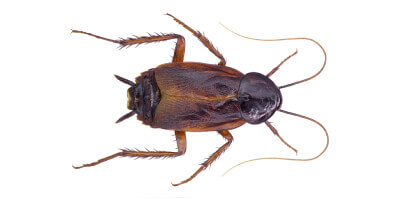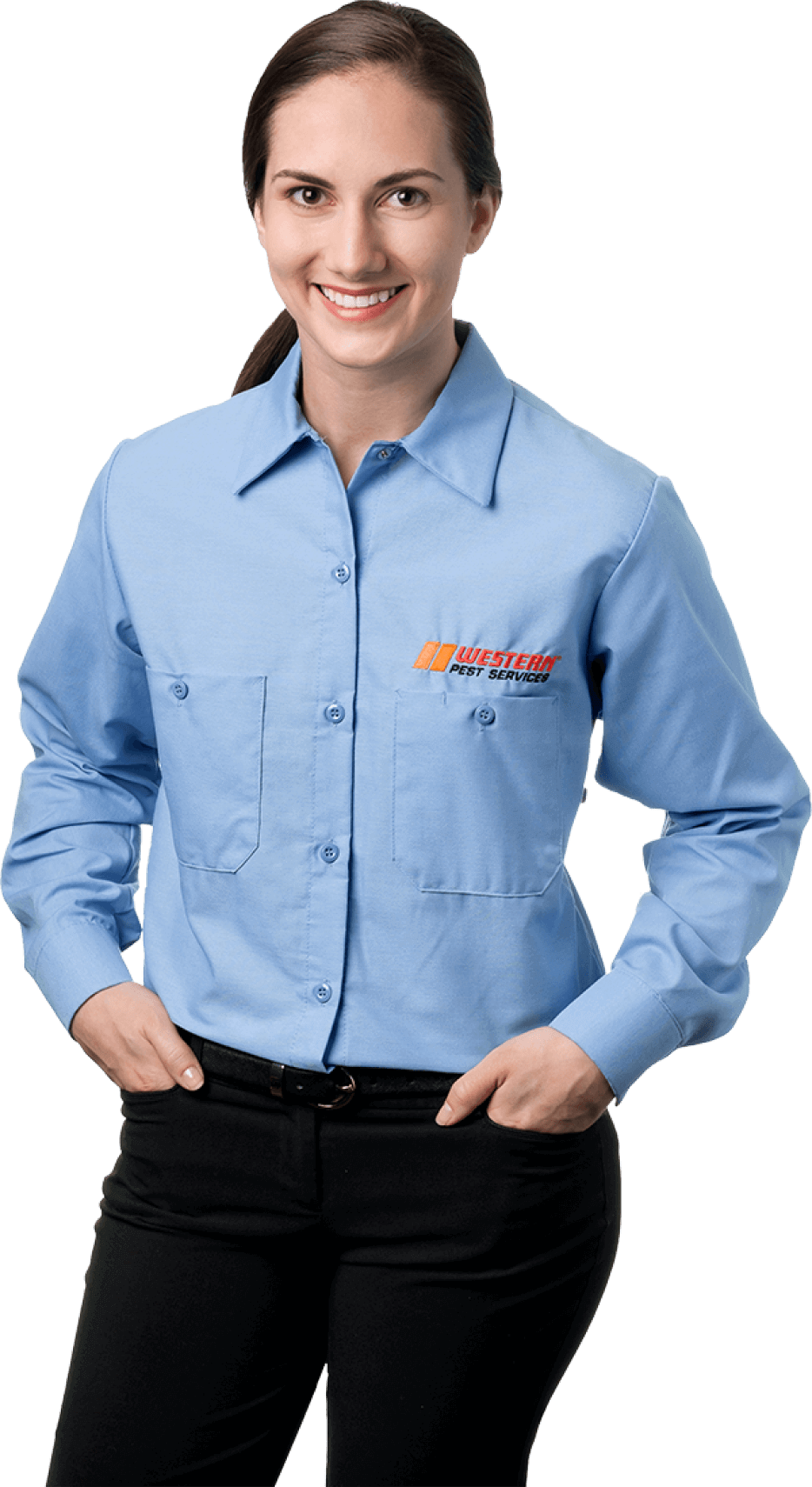Cockroaches in New Jersey
We provide homes and businesses in New Jersey with expert cockroach control.
COCKROACH SPECIES IN NEW JERSEY

The most prominent cockroaches in New Jersey are the German cockroach, the Oriental cockroach, and the American cockroach. All three are disgusting and can track bacteria wherever they walk, so while it may matter for the correct cockroach extermination treatment, all you probably care about is getting rid of the cockroaches! We can understand that. The American cockroach is the largest cockroach found in the area and the most common cockroach in sewers. The adults can grow to between 1.5 and 2 inches in length. American cockroaches are large insects with flattened, reddish-brown bodies and matching wings and have unique, yellow-colored “halos” on their backs behind their heads. From the side, you can see that cockroaches have exposed wings rather than wings covered by a hard outer casing. This trait helps to separate them from beetles that may look like cockroaches.
German cockroaches hide in dark places like refrigerator motor housing, behind dishwashers, and inside cabinets only to crawl out when you least expect it. Their long, flat bodies allow them to squeeze into food containers and slip through tiny cracks with ease. German cockroaches are light brown to tan with two dark “racing stripes” on their backs. They have 6 legs, 2 antennae, are oval in shape, and are about 1/2″-5/8″ long.
Oriental cockroaches can be either shiny black or dark reddish-brown in color. They have a “greasy” sheen. As adults, the male and female cockroaches, though both large in size, are quite different in appearance. Growing to only 1 inch in length, the smaller males have shortened, three-quarter-length wings. Female Oriental cockroaches have no wings and grow to about 1 ¼ inch. Whether they have wings or not, neither can actually fly.
German cockroaches hide in dark places like refrigerator motor housing, behind dishwashers, and inside cabinets only to crawl out when you least expect it. Their long, flat bodies allow them to squeeze into food containers and slip through tiny cracks with ease. German cockroaches are light brown to tan with two dark “racing stripes” on their backs. They have 6 legs, 2 antennae, are oval in shape, and are about 1/2″-5/8″ long.
Oriental cockroaches can be either shiny black or dark reddish-brown in color. They have a “greasy” sheen. As adults, the male and female cockroaches, though both large in size, are quite different in appearance. Growing to only 1 inch in length, the smaller males have shortened, three-quarter-length wings. Female Oriental cockroaches have no wings and grow to about 1 ¼ inch. Whether they have wings or not, neither can actually fly.
what Problems do cockroaches cause in new jersey
Because American cockroaches tend to hand around in filthy places, they pick up germs and bacteria on their legs and bodies as they crawl through decaying matter or sewage. When this particular species of cockroach steps foot into your New Jersey home, the bacteria and germs they bring with them can and will spread disease and contaminate your food.
German cockroaches are more than just a nuisance. They have been associated with outbreaks of illness and allergic reactions. Cockroaches spread at least 33 kinds of bacteria, 7 kinds of human pathogens, and 6 kinds of parasitic worms.
Often called “water bugs,” Oriental cockroaches eat various types of organic matter but prefer starch (e.g., book glue, decaying vegetable matter, grain products). All cockroaches are filthy. Oriental cockroaches can cause additional problems, though. They transmit bacteria such as E. coli and salmonella, taint food with pathogens, and excrete foul odors. Their waste products can be problematic for people in New Jersey with allergies and asthma. All cockroaches are an issue for food processing manufacturers in New Jersey in particular but they don’t have a preference. They will go wherever they can get their three basic needs: food, water, and shelter.
German cockroaches are more than just a nuisance. They have been associated with outbreaks of illness and allergic reactions. Cockroaches spread at least 33 kinds of bacteria, 7 kinds of human pathogens, and 6 kinds of parasitic worms.
Often called “water bugs,” Oriental cockroaches eat various types of organic matter but prefer starch (e.g., book glue, decaying vegetable matter, grain products). All cockroaches are filthy. Oriental cockroaches can cause additional problems, though. They transmit bacteria such as E. coli and salmonella, taint food with pathogens, and excrete foul odors. Their waste products can be problematic for people in New Jersey with allergies and asthma. All cockroaches are an issue for food processing manufacturers in New Jersey in particular but they don’t have a preference. They will go wherever they can get their three basic needs: food, water, and shelter.
100% Satisfaction Guarantee
24-Hour Guaranteed Response
Board Certified Entomologists
cockroach Control Services in New Jersey
Getting rid of cockroaches in Northern New Jersey, Central New Jersey (yes it exists), and Southern New Jersey is a job for pest control experts who are most familiar with the specific cockroach species activity in and around the Garden State. The local expertise, knowledge, and experience provided by the professionals at Western Pest Services include almost 100 years of controlling and exterminating cockroaches and many other pests in New Jersey. We can help you quickly root out the problems you’re having at your New Jersey home or business.
Need help with cockroaches?
Get a Quote
